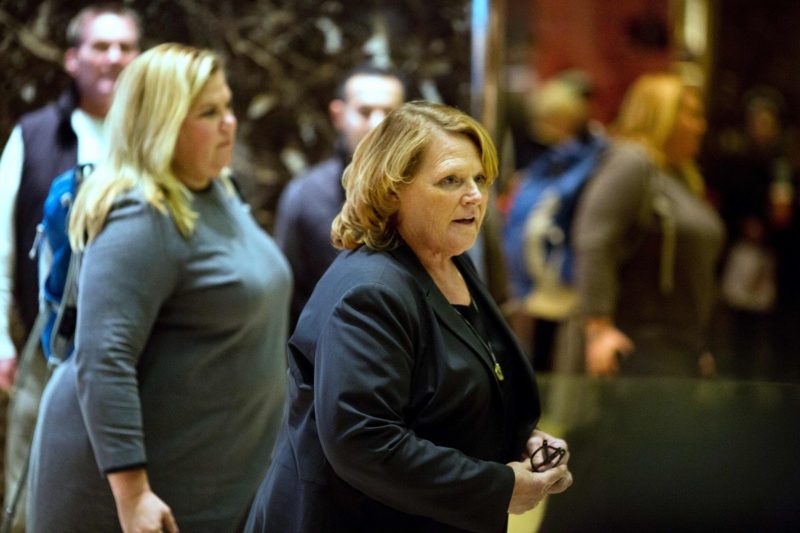Amid Heitkamp’s Speculated Departure, North Dakota Girds for ‘Immediate Threat’ on Abortion
"I think Heitkamp is incredibly important for women’s health," Amy Jacobson of Planned Parenthood Minnesota, North Dakota, South Dakota said in an interview with Rewire.

Democrats seemed poised to lose a critical seat in the U.S. Senate when North Dakota’s lone congressional Democrat ascended in Trump tower’s much-photographed golden elevator last month for a conversation with the president-elect.
Reports from Politico favored Sen. Heidi Heitkamp as a likely pick for secretary of agriculture. The first-term senator mentioned “ongoing discussions” about a cabinet post in a recent radio interview with North Dakota’s KFGO.
“I’m not saying ‘never, never,’ but I will tell you that I’m very, very honored to serve the people of North Dakota and I hope that no matter what I do that will always be my first priority,” Heitkamp said when asked about her meeting with President-elect Donald Trump.
North Dakota Republicans control both state legislative chambers, the governor’s office, and two of the state’s three congressional seats.
Voters in the state resoundingly supported Trump, who won all but two of the state’s 53 counties in the 2016 presidential election.
North Dakota holds one of the nation’s worst records for abortion access: The state earned an “F” for reproductive rights in a 2016 NARAL Pro-Choice America report card.
Heitkamp, meanwhile, is regarded as a pro-choice ally, earning a 100 percent voting record in 2015 from NARAL. National reproductive rights advocates say they’re banking on Heitkamp’s continued support in 2017.
“I think Heitkamp is incredibly important for women’s health,” Amy Jacobson of Planned Parenthood Minnesota, North Dakota, South Dakota said in an interview with Rewire.
Should she join the Trump administration, North Dakota law requires a special election within 95 days. Reports suggest a Republican would likely win her seat, putting the state entirely in GOP hands.
Asked about the potential state and party ramifications of Heitkamp’s possible departure for the Trump administration, Robert Haider, executive director of the North Dakota Democratic-NPL Party, told Rewire that Heitkamp is a moderate with a record of working on both sides of the aisle.
Still, it would mean Democrats would lose a seat in the U.S. Senate, where they’re already in the minority.
“2013 All Over Again”
North Dakota is an abortion care desert, with just one abortion provider for about 132,000 women of reproductive age, according to the Guttmacher Institute. The anti-choice group Americans United for Life in 2016 ranked North Dakota in its top-ten states for anti-choice restrictions. North Dakota outranked the notoriously onerous state of Texas.
“We do not want to be a state where there’s no abortion access,” Tammi Kromenaker, clinic director of Red River Women’s Clinic, the state’s sole abortion facility, said of the Republican-driven erosion of reproductive rights.
Even so, reproductive rights advocates hail North Dakota’s strong public health safety net for the state’s poorest residents. The federal Title X program funds 20 sites that offer annual exams, birth control, cancer screenings, and STI treatment, according to the National Family Planning & Reproductive Health Association (NFPRHA). More than 8,000 North Dakotans relied on these services in 2015.
That could change under a Trump administration.
Title X is a recurring GOP target, as House Republicans have tried five times in the past seven years to defund the program, according to a July statement from NFPRHA.
“It is one of the programs that [some suggest] may come under attack,” Planned Parenthood’s Jacobson told Rewire. “A lot of our public heath care will be at risk if that program is eliminated. It will be incredibly important for Sen. Heitkamp to stand up for Title X funding.”
Meanwhile, the state’s reproductive rights advocates expect the 2017 state legislative session to bring a surge of anti-abortion bills.
“We expect [2017] to be 2013 all over again, when abortion dominated the legislative session,” Kromenaker told Rewire.
Kromenaker said 2013 was a brutal year for reproductive rights. Republican lawmakers advanced unconstitutional bans on abortion care at six and 20 weeks and for sex selection and genetic abnormalities. The state’s GOP-held legislature pushed through a measure requiring abortion care providers maintain hospital admitting privileges—a restriction the U.S. Supreme Court found unconstitutional in a Texas case.
“I’ve been doing this work for 23 years now,” Kromenaker told Rewire in a phone interview. North Dakota “got even redder [in the 2016 election]. The most immediate threat to women and families in North Dakota is the 2017 legislative session.”
Kromenaker has witnessed a few victories. She noted that 64 percent of the state’s voters in 2014 rejected a radical “personhood” ballot measure. The measure would have effectively outlawed abortion care and most birth control by making a fertilized egg a person with constitutional rights. And a federal court declared the state’s six-week ban on abortion unconstitutional.
Kromenaker believes North Dakota can’t be considered a wholly red state. Instead it’s an amalgam, with ultra-conservatives and libertarians in the west, conservatives in the middle, and liberals in the east. There are places where progressives might gain a greater toehold, she suggests.
For now, she said “we will fight to keep access open in North Dakota.”

